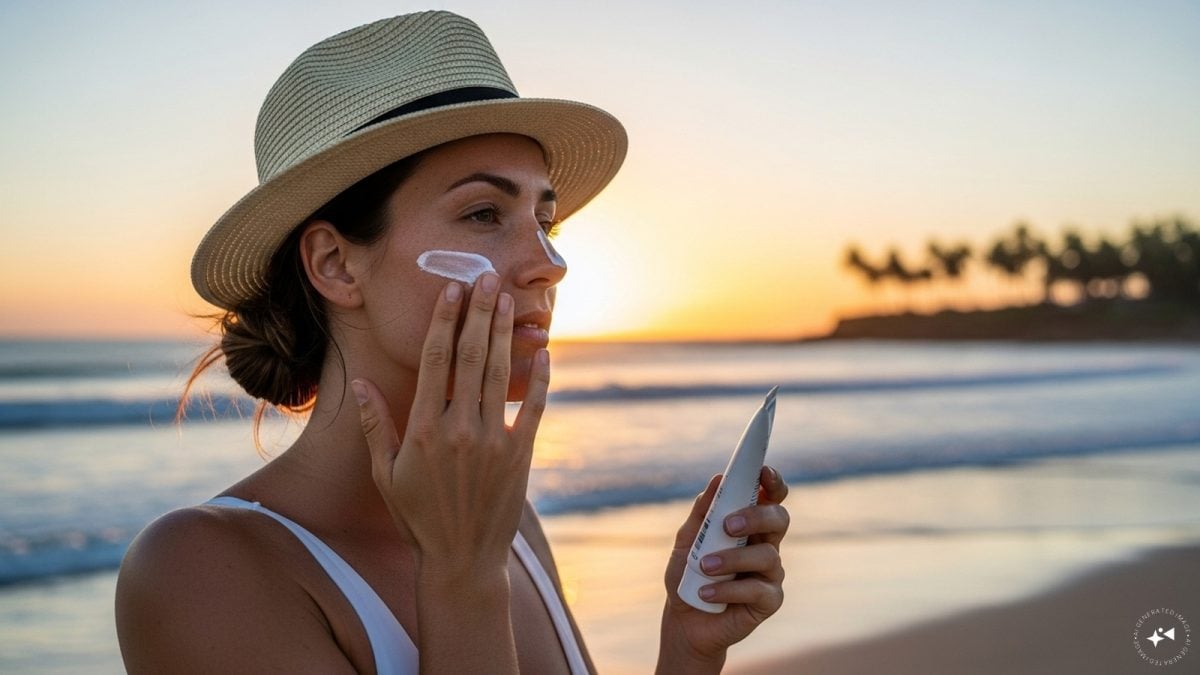Last Updated:
Skipping sunscreen can cause more than just sunburn. Experts reveal how it accelerates ageing, triggers pigmentation, and raises skin cancer risks.

Skipping sunscreen accelerates ageing and raises skin cancer risks.
For many, sunscreen is seen as optional – a product reserved for beach days, tropical vacations, or peak summer afternoons. But dermatologists and skin experts warn that skipping SPF has far-reaching consequences that go well beyond sunburn. From premature ageing to hyperpigmentation and even skin cancer, the cumulative effects of unprotected sun exposure can be both visible and life-threatening.
Celebrity Cosmetologist Dr. Mahnaz Jahan Begum, Founder of Keradis and Medical Director at Aterm Clinics, Kolkata, puts it bluntly: “Skipping sunscreen can lead to various skin issues, ranging from premature ageing to skin cancer. UV exposure causes fine lines, wrinkles, and age spots, while also contributing to hyperpigmentation, melasma, and other forms of skin discolouration. More seriously, UV radiation increases the risk of melanoma, basal cell carcinoma, and squamous cell carcinoma.”
The Link Between Sunscreen and Ageing
Premature ageing, also known as photoaging, is one of the most common and underestimated consequences of skipping SPF.
Dr. Begum explains, “UV rays are responsible for up to 80% of visible facial ageing, making sunscreen a crucial part of any anti-ageing skincare routine. Younger skin is more prone to sun damage, so women in their 20s and 30s should prioritise sunscreen to prevent long-term damage.”
Adding to this, Dr. Geetika Mittal Gupta, Skin Expert and Cosmetologist, notes: “Not using sunscreen regularly leads to fine lines, wrinkles, and loss of elasticity caused by UV exposure, breaking down collagen and elastin. Hyperpigmentation, such as dark spots and uneven tone, is also linked to unprotected exposure.”
She emphasises that this isn’t hype: “Daily sunscreen use is one of the most effective ways to delay ageing. Clinical studies show that people who use SPF consistently develop fewer signs of ageing and may even see improvements in texture and tone.”
How Early Sun Damage Affects Younger Skin
Even if wrinkles aren’t visible yet, cumulative sun damage in your 20s and 30s can quietly set the stage for serious concerns later.
Dr. Gupta warns: “UV radiation penetrates deep into the skin, damaging collagen and elastin fibres, leading to premature sagging and fine lines. It also causes pigmentation issues like sunspots and melasma, and compromises skin health, leaving it dull and fragile. Essentially, sun damage in your 20s and 30s lays the groundwork for more pronounced wrinkles, sagging, and discolouration in your 40s and beyond.”
Is It Too Late to Start?
The reassuring news is that SPF offers benefits at any age.
“It’s never too late to start using sunscreen regularly,” says Dr. Begum. “Consistent use can reduce the risk of skin cancer, prevent premature ageing, and improve overall skin health.”
Dr. Gupta agrees: “Even if damage has already occurred, SPF helps prevent further harm and slows ageing. Combined with active ingredients like retinoids or vitamin C, skin can repair more effectively and show improvements over time.”
Inside-Out Sun Protection
External care is vital, but nutrition also plays a role in protecting skin from UV damage. Sheela Krishnaswamy, Nutritionist and Wellness Consultant, highlights: “Nutrients like protein, omega-3 fatty acids, vitamins A, C, D and E, and minerals like zinc support skin health. Foods like oily fish, nuts, seeds, guava, papaya, mango, and leafy greens provide antioxidants that guard against oxidative stress.” She points out that almonds, rich in vitamin E, have been shown in studies to reduce pigmentation and wrinkles. Hydration, too, is non-negotiable.
SPF And Consumer Mindsets
Despite the science, many people still think of sunscreen as seasonal or optional. Malini Adapureddy, Founder & CEO of Deconstruct, observes: “Consumers are primarily motivated by visible concerns like tanning, dullness, and uneven tone. Skin cancer risks are not yet a major driver due to low awareness, though education is slowly changing this.”
She adds, “We try to demystify SPF use by showing how sun damage happens daily – even indoors or under clouds. Myths persist, like darker skin tones not needing SPF or sunscreen being unnecessary on cloudy days. In reality, all skin types are vulnerable, and UVA rays penetrate glass and clouds.”
The benefits of daily sunscreen are backed by science: reduced skin cancer risk, delayed ageing, and better skin health overall. While moisturisers and serums can enhance your routine, SPF remains the single most important step for protecting your skin.
- Location :
Delhi, India, India








